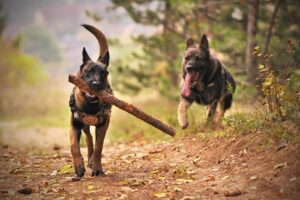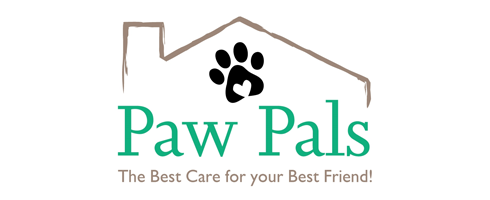Training and consistency play a major role in helping a dog adjust, but for busy pet owners, having a dog sitter can be an excellent way to reinforce socialization habits when you are away. A professional dog sitter can help introduce new people and experiences in a structured and positive manner, ensuring your dog builds confidence over time.
If you have recently adopted a puppy, brought home a rescue dog, or simply want to improve your dog’s behavior in social settings, following structured socialization techniques will make all the difference.
Understanding Dog Socialization
 Proper socialization teaches dogs how to interact appropriately with humans, animals, and unfamiliar environments. Well-socialized dogs are friendly, confident, and less likely to develop behavior issues such as excessive barking, anxiety, or destructive tendencies.
Proper socialization teaches dogs how to interact appropriately with humans, animals, and unfamiliar environments. Well-socialized dogs are friendly, confident, and less likely to develop behavior issues such as excessive barking, anxiety, or destructive tendencies.
Dogs who do not receive adequate socialization may become fearful, aggressive, or overly anxious in new situations. This can make outings, vet visits, and even routine walks more challenging.
There are effective ways to socialize a dog at any stage of life, but early exposure is always the best approach.
Socializing Puppies
Starting socialization at an early age helps puppies become well-adjusted adult dogs. The first few months of life are crucial for shaping their personalities and behaviors.
Start at the Right Age
Puppies should remain with their mother and littermates until at least eight to ten weeks old. During this time, they learn important behaviors such as bite inhibition and how to interact with other dogs. Puppies separated too early may exhibit behavioral problems, including anxiety or aggression.
Introduce Other Dogs Gradually
Regular exposure to friendly dogs helps build social confidence. Some of the best ways to do this include puppy training classes, dog park visits, or scheduling playdates with dogs known to be well-socialized. These experiences teach puppies appropriate play behavior and how to read canine body language.
Expose Them to Different People
Puppies should interact with a variety of people, including children, adults, and individuals wearing hats, backpacks, or sunglasses. Hosting small gatherings or having friends over to meet your puppy can help prevent fear-based reactivity toward new people. Allow visitors to offer treats or engage in calm interactions to create positive associations.
Introduce Them to New Environments
Limiting a dog’s exposure to just the home environment can lead to fear of the outside world. Taking puppies on car rides, to parks, pet-friendly stores, or different walking routes allows them to experience different sights, sounds, and smells. Exposure to common household noises such as vacuum cleaners or doorbells also prevents unnecessary fear responses later on.
Socializing Older Dogs
 If a dog was not properly socialized as a puppy, challenges can arise when introducing them to new experiences. However, with patience and consistency, even an older dog can learn to be more comfortable in various situations.
If a dog was not properly socialized as a puppy, challenges can arise when introducing them to new experiences. However, with patience and consistency, even an older dog can learn to be more comfortable in various situations.
Start Slowly
Older dogs who lack socialization may react negatively to sudden exposure to busy environments or unfamiliar animals. Slow and controlled introductions are key. Initially, walk near a dog park rather than entering, allow them to observe other animals from a safe distance, and introduce them to new dogs one at a time instead of in large groups.
Use Positive Reinforcement
Encouraging positive interactions through rewards makes the experience enjoyable. Calm behavior around strangers or other dogs should be rewarded with treats, verbal praise, or favorite toys. Avoid punishment for fearful reactions, as this can escalate anxiety rather than resolve it.
Allow the Dog to Set the Pace
If a dog displays stress or discomfort in social settings, never force interactions. Allow them to engage on their terms and build confidence gradually. For some dogs, simply being near other animals without engaging in direct play is a big step forward.
The Role of a Dog Sitter in Socialization
For pet owners with demanding schedules, a dog sitter can serve as an important part of a dog’s socialization routine. Having a trained, knowledgeable pet sitter can provide structured exposure to new environments and experiences.
A trusted dog sitter can assist in:
- Taking the dog on regular walks in different settings
- Introducing them to new people in a controlled manner
- Reinforcing positive behaviors through rewards and encouragement
- Helping them build confidence if they are shy or anxious in social situations
If a dog is particularly wary of strangers, having a consistent sitter who visits regularly can help establish trust and familiarity over time.
Book Northern Virginia’s Most Trusted Dog Sitters
 Socialization is essential for a dog’s well-being. Whether raising a new puppy or working with an older rescue, taking the right steps to expose dogs to various experiences helps them grow into confident and well-adjusted companions.
Socialization is essential for a dog’s well-being. Whether raising a new puppy or working with an older rescue, taking the right steps to expose dogs to various experiences helps them grow into confident and well-adjusted companions.
For pet owners who need assistance while at work or when traveling, hiring a professional dog sitter can provide continuous support in reinforcing good social behaviors.
At Paw Pals, our experienced pet sitters understand the importance of structured socialization and can help your dog feel more comfortable in new situations. Contact Paw Pals today to learn more about our professional pet sitting services and how we can assist in caring for and socializing your dog.


